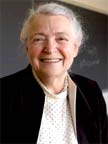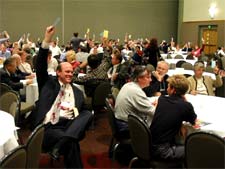Meeting Highlights & Interview with Mildred Dresselhaus
by the University of Arkansas
—
by Bryon Western & David Cameron, University of Arkansas
| Meeting
Highlights |
|
<
back to congress reports
< photo albums
 |
|
Congress
attendees visit between sessions. |
|
Looking
back, I am trying to decide if the conference was worth
the two way 14-15 hour van ride (it felt like 30). It turns
out it was, for several reasons. The first has nothing to
do with the conference and I really could have done it without
leaving Arkansas, but I was forced to hang around and actually
get to know several people in my own department that I would
not have gotten to know as well otherwise.
The
second was the opportunity I had to interview Dr. Millie
Dresselhaus, Chair of the AIP Governing Board (see article
below). I found it amazing that she was so friendly and
so willing to give up quite a bit of her personal time to
talk to an undergraduate student from Arkansas. It is easy
to see why she is not just a respected physicist, but also
an admirable person.
For
me, the trip to the Trinity Site was the best part of the
meeting. To stand in awe of the history that took place
there and here about it from someone who was actually there
was quite a humbling experience.
Lastly,
I would like to think New Mexico for introducing me to green
chili con carne. I love that stuff.
—
Bryon Western, University of Arkansas
|
|
Interview with Mildred "Millie" Dresselhaus |
 |
|
Mildred
Dresselhaus |
|
Mildred
“Millie” Dresselhaus started her higher education
at Hunter College in New York. Largely due to the fact that
many women of her day where being directed into education
and because it was considered a practical career choice, she
began her undergraduate career with the intention of being
a school teacher. After showing great aptitude in the sciences,
she was encouraged to pursue as much science as possible from
another well know woman in physics, Rosalind Yellow (now very
well known for medical physics research). Millie now continues
this mentoring tradition by helping encourage women to enter
classically male dominated fields.
Professor Dresselhaus did indeed end up teaching; albeit,
surely not in the capacity she had originally imagined.
She is now a tenured professor at one of the most prestigious
schools in the country, MIT. As faculty at MIT she has headed
research on many state-of-the-art projects such as superconductivity,
magneto-optics, and now carbon nano-tubes. When asked what
her most favorite project that she had ever worked on, she
smiled and said, “The ones I’m working on now.”
She said she was proud of the work she had done in the past,
but she always loves most what she is working on right now;
otherwise, she would be working on something else.
One of the most impressive things about Millie was the
greetings and recognition she received from her peers. Sitting
in an out-of-the-way corner in the union of the University
of New Mexico, several colleagues who had spotted her from
quite a distance, came over to just to say hello and how
glad they were that she was here. To one such colleague
she said, “I’m giving a talk on ethics. I bet
you didn’t know that I could give a talk on ethics.”
He responded, “It doesn’t surprise me, I’ve
seen you give talks on about everything else.”
Dr. Dresselhaus’s diverse experience and vast resume
has indeed given her the qualifications to speak on a multitude
of subjects. She has held a job from the time she was eight
years old when her school was paying her to teach a mentally
handicapped child to read. She has held public and appointed
positions such as chief scientific advisor to President
Bill Clinton and is currently the first woman to chair the
governing board of the American Institute of Physics. Although
she was somewhat surprised to be asked to give a talk on
ethic, it would seem that her life experiences more than
qualify her to do so.
Speaking on ethics, Millie said that living with the notoriety
that she has achieved, it feels as though she can not make
a mistake; although, this is not really any added pressure
to her. She is living the respectful and ethical life she
would have anyway. The most important thing for her was
to set a good example for her children. A key point she
wanted to get across, both in this interview and in her
main speech, was this: The seed for an ethical life must
be planted at home.
Personal
Notes:
Getting to do this impromptu interview with Dr. Dresselhaus
was absolutely one of the highlights of the conference for
me. She could not have been friendlier. It was amazing to
me that this noted physicist, who could have been talking
to anyone at the conference, sat down with me and gave me
more than an hour of her time. I was slightly nervous talking
to someone of such prestige, but the anxiety quickly left
because she was so personable. So, I just wanted to say thank
you once more to Professor Millie Dresselhaus for her time
and courtesy. —
Bryon Western, University of Arkansas
|
| 2005
World Year of Physics |
 |
|
Congress
attendees cast their votes on the issue of Sigma Pi
Sigma developing ethical recommendations for the physics
community. |
|
In
October 2004, Sigma Pi Sigma, the Society of Physics Students,
and the American Institute of Physics all came together to
celebrate the beginning of the World Year of Physics.
The
first event celebrating and kicking-off the World Year of
Physics was a conference attended by all three organizations
and held in Albuquerque, New Mexico. Though many different
presentations were given, one of the main themes for the
conference was Ethics in Physics. Over the course of the
weekend, talks were given and discussions were facilitated
covering topics such as Ethics in Military, Ethics in Academia,
and Ethics in Industry. The presenters were careful not
to promote personal ethical views, but rather how to determine
one's own ethical views and how to determine if the views
of the person and organization fit well together.
The talks and discussions were very informative and raised
some issues that may not have been immediately apparent.
These in depth examinations of both personal and organizational
ethical stances will make the choices that the conference
attendees have to make in the future much easier and more
well informed.
—
David Cameron, University of Arkansas
|
| |
|